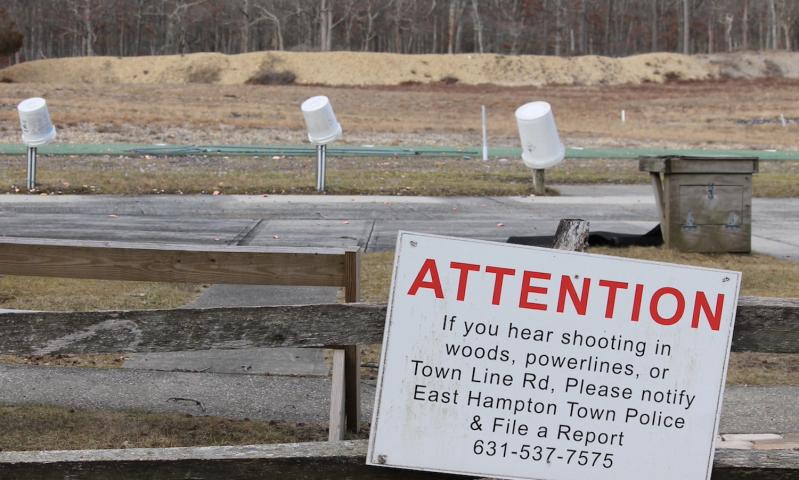The East Hampton Town Board has negotiated “important provisions” in connection with a lease renewal for the Maidstone Gun Club in Wainscott, which has been closed for almost three years and remains the subject of litigation brought by several residents who say bullets fired from the club have hit their houses.
A statement from Jacob Turner, the town attorney, provided to The Star on Friday, lists among the provisions the permanent shutdown of the club’s outdoor rifle range and requirements that the club will “regularly reclaim lead and also remediate lead” when required by the State Department of Environmental Conservation or the federal Environmental Protection Agency. “Enhanced security measures” and the club’s hours of operation are also listed, without elaboration.
The club, covering mostly forested land adjacent to East Hampton Airport, has a tenant option to renew the existing lease, Mr. Turner noted, its 30-year lease of 97 acres of parkland at $100 per year having expired in 2023. “The dollar amount and acreage, among other terms, are not yet final,” he said, “as renewal terms continue to be negotiated.”
The statement came in response to an inquiry to Supervisor Kathee Burke-Gonzalez and members of the town board last Thursday as to their position on a renewed lease for, and the continued operation of, the gun club. That inquiry, in turn, followed an Aug, 25 email to the board from Barry Raebeck, a Wainscott resident, member of the hamlet’s citizens advisory committee, and a vocal critic of the gun club.
Mr. Raebeck’s email included page-one articles in The Star from 2004 and last month. The former referenced a call for a lead assessment and formal management plan for the club from Robert S. DeLuca, president of what was then known as the Group for the South Fork, to then-Supervisor Bill McGintee. Also included was an Aug. 22 letter from the Wainscott Citizens Advisory Committee to the board asking that it reject a lease renewal for the club “and instead pursue alternative uses of the land that better reflect today’s standards of public safety, environmental protection, and community benefit.”
These documents, Mr. Raebeck wrote to the board, “highlight the clear ongoing danger we face from the hazardous waste site that is the former gun club facility, that facility located on our sole source of pure water, an aquifer protection overlay area.” The club’s operation for 30 years at its present site, with no environmental oversight, “is also a matter of gross negligence,” he wrote. “Outdoor gun clubs by definition produce toxic waste resulting in severe damage to land, air, and water.”
This “environmental calamity,” he continued, is separate from what he said is continued danger to anyone within a 1.5-mile radius of the site, “endless high-decibel noise and disruption,” and “the obvious misuse of valuable public land — and that for a minimal fee that is simply a subsidy to gun club members.”
Another attachment in Mr. Raebeck’s email to the board is a 2017 letter from an outside attorney for the town to the Federal Aviation Administration’s Office of Airport Compliance and Management Analysis detailing a “corrective action plan” for matters including non-aeronautical leases. The town, according to the letter, committed to structure any future gun club lease following the then-current lease’s Oct. 31, 2023, expiration to “cover only the approximately 10 acres the gun club actually uses,” limit its term to three to five years, and to “charge the gun club comparable fair market value commercial lease rates” or “make the club leasehold property available for commercial development by providing shorter lease terms, if the town utilizes the adjacent property for commercial purposes.”
“The F.A.A. is concerned that leasing such a large part of the airport property for so little money essentially forces other lessees to subsidize the gun club,” Mr. Raebeck wrote to the board. “Is the F.A.A. aware of the current negotiations to continue business as usual?”
Mr. Raebeck’s letter was also sent to the town’s sustainability advisory committee. “I might add that 30 years ago when the gun club signed their 30-year lease with the town, climate change was not a critical concern in the town,” Lena Tabori, a former member of the sustainability committee, wrote in reply. “Neither was population density. Nor were we as worried about the aquifer as we are today. Not to mention the revenue. . . . Now, as the gun club wishes to renegotiate a lease, we as a town are facing a massive need for space — for solar farms, for battery storage, for affordable housing, for trees.”
On Aug. 26, Mr. Raebeck wrote to the D.E.C. “It is common knowledge that outdoor shooting ranges are highly toxic and invariably result in severe environmental damage,” he wrote. He also explained that a judge had granted a temporary restraining order barring the use of all the club’s facilities until further notice in response to a lawsuit filed by several Merchants Path, Wainscott, property owners who reported finding bullets lodged in their houses. Neighbors claim this happened at least eight times, he wrote, “yet the town board did nothing about that either . . . even after a [state] police report confirmed that the bullets did come from” the gun club.
Mr. Raebeck went on to note that plaintiffs in the lawsuit engaged Roux Environmental Engineering and Geology to investigate potential soil pollution from lead, and that the consultant detected lead in all 30 soil samples collected at the gun club in March 2023. “As persistent calls from local citizens duly concerned about health and safety have been ignored for decades, I am writing to your office,” he wrote.
Members of the town board, two of whom are campaigning for re-election along with the supervisor, did not directly reply to The Star’s inquiry. J.P. Foster, a candidate for town councilman in the Nov. 4 election and a former member of the club, said this week that the club’s future will depend on the outcome of the lawsuit, but “overall, I support the gun club, with restrictions.”
“We’ve got to make this work for everyone,” Mr. Foster said. “I don’t want it closed, but they’ve got to keep it safe. In speaking to members, there is a plan in place.” The provisions listed in Mr. Turner’s statement are “pretty reasonable,” he said.




